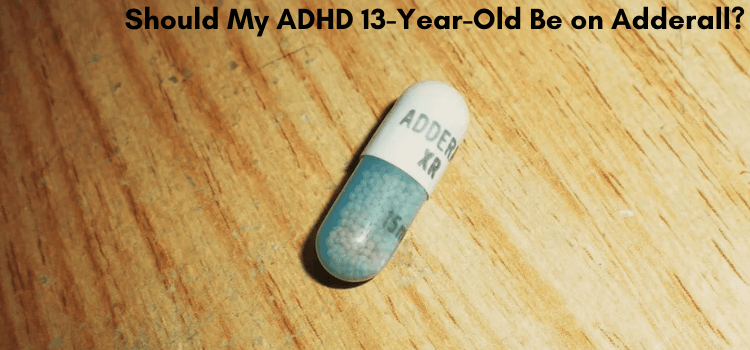When ADHD symptoms in 13 year olds get out of hand, medication may be able to help. Adderall is one of the most common prescriptions, but it has some downsides. Are the benefits worth the side effects? The truth is that efficacy varies on a case-by-case basis, so it’s essential to learn about this medication before deciding if it’s right for your child.
What Are the Pros/Cons of Adderall?
Most medications have their upsides and downsides, so it’s essential to thoroughly research options with your doctor before settling on a course of action. If your child’s physician recommends Adderall, here’s what you can expect.
The Pros
Studies show that Adderall and other stimulants, such as Ritalin, alleviate the symptoms of attention deficit hyperactivity disorder:

- Impulsiveness
- Excessive talking and physical movement
- Short attention span
- Difficulty focusing
- Inability to sit still
- Forgetfulness
- Difficulty with organization
These symptoms can interfere with school performance and socializing, so reducing their impact can improve kids’ self-esteem and mental health.
Adderall has been around since 1996, so its use is well-documented. Over 25 years of study means it’s safe and effective.
The Cons
Like other prescription stimulants, the Adderall active ingredients contain chemicals that can be addictive:
- Dextroamphetamine sulfate
- Amphetamine sulfate
- Amphetamine aspartate
- Dextroamphetamine saccharate
If patients suddenly stop taking their medications, they may experience withdrawal symptoms.
The good news is that since it’s a prescription, Adderall requires physician supervision. Patients who take their medication as directed can successfully relieve their symptoms without developing an addiction. There are also long-release versions of Adderall that have a significantly smaller risk of chemical dependency.
However, no medicine is without side effects. Even people who take Adderall as prescribed may experience the following:
- Dizziness
- Lack of appetite
- Anxiety
- Dry mouth
- Trouble sleeping
- Weight loss
- Headaches
- Nausea
- Stomach pain
- Constipation
Is My Child a Good Candidate for Adderall?
Adderall doesn’t work for everyone. In fact, it can put some patients at risk; due to its potential effects on heart rate and blood pressure, individuals with heart conditions have a higher risk of developing other cardiovascular diseases. However, individuals without a pre-existing heart condition can tolerate the medication without the same level of risk.
While most people know Adderall for its connection with ADHD, it can also treat narcolepsy, a serious neurological disorder. Individuals with this condition experience the following:
- Hallucinations
- Excessive daytime sleepiness
- Sleep paralysis
- Cataplexy (uncontrollable loss of muscle tone)
Many people with narcolepsy also report difficulty focusing and decreased alertness. From the outside, narcolepsy may look like frequent and inappropriate napping. People unfamiliar with the disorder may assume patients are rude or lazy, but the truth is that individuals have no control or warning about when they’ll fall asleep.
Adderall can reduce the severity of narcolepsy symptoms by boosting norepinephrine levels in the brain. This natural chemical promotes wakefulness, helping patients regulate their sleep cycles.
If your child recently received an ADHD diagnosis, it’s time to learn about Brillia ADHD products. With the proper support, kids with this disorder can succeed academically and socially.






Leave a Reply